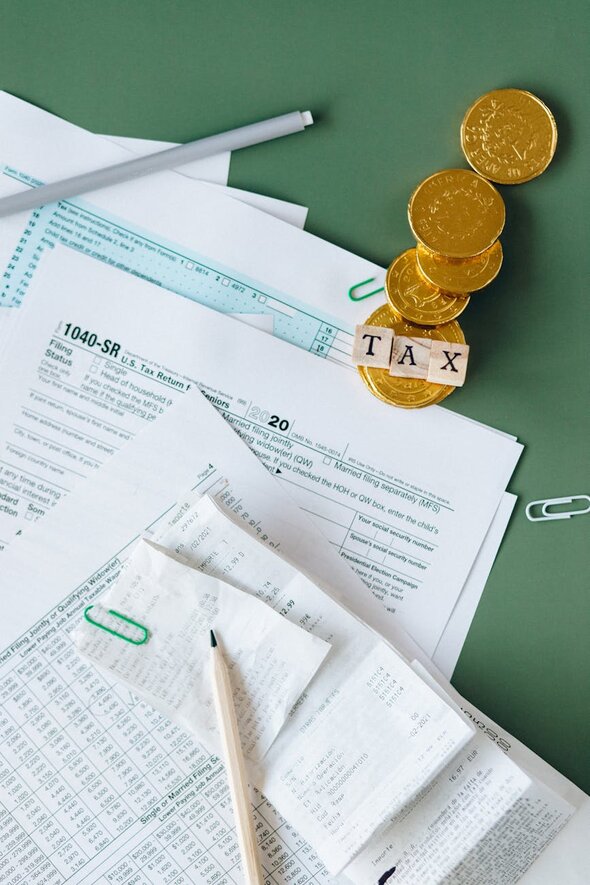Lets Get Into The Nitty Gritty
The complexity of the UK tax system is evident in the fact that the average British taxpayer dedicates approximately 11 hours annually to managing their tax affairs.
This guide aims to simplify this complexity by presenting 35 key tax insights that will transform your understanding of the UK tax landscape.
Whether you're an individual taxpayer, a business owner, or simply looking to enhance your financial literacy, this comprehensive overview will equip you with the knowledge to navigate the British tax system more effectively.
Let's embark on this informative journey to demystify UK taxes and elevate your financial IQ!
Here are the 35 UK Tax Insights Demystified!
1. Income Tax: Navigating PAYE and Self-Assessment
Alright, let me tell you about my journey with income tax. It's been a wild ride! When I first started working, I was clueless about PAYE. My payslips might as well have been in Greek. But over time, I figured out that those mysterious tax codes actually mean something important.
Now, self-assessment - that's a whole different beast. I learned the hard way about those deadlines and penalties. Ouch! Missing a deadline once cost me a pretty penny. But hey, live and learn, right?
The real game-changer was understanding personal allowance and tax bands. It's like unlocking a secret level in a video game. Knowing how much you can earn before paying taxes and how the different bands work can really help you plan your finances better. Trust me, it's worth taking the time to wrap your head around it!


2. National Insurance Contributions
(NICs): Beyond Payslip Deductions
When I started working, I thought National Insurance Contributions were just another paycheck deduction. I couldn't have been more wrong! Understanding the different classes of NICs was confusing at first, especially when I switched from employee to self-employed.
The rates and thresholds for NICs change often. For 2024, I've made sure to memorise these numbers. It's important because they affect your take-home pay.
Here's what I wish I'd known earlier: NICs aren't just deductions. They're linked to your state benefits eligibility. It's like contributing to a government savings account for your future. While it's not the most exciting topic, understanding NICs can really impact your financial planning. Your future self will thank you for getting a handle on this now!
3. Value Added Tax (VAT): Comprehending Consumption Tax
Value Added Tax used to be a real head-scratcher for me. When I started my small business, I was clueless about VAT registration thresholds. I nearly missed registering when I hit the threshold - that was a close call!
Figuring out the different VAT rates felt like learning a new language. Standard, reduced, and zero rates - who knew there were so many? I found myself constantly looking up which rate applied to what product. Every sale felt like a mini-puzzle.
The real game-changer was discovering how to claim back VAT for my business. Initially, I was leaving money on the table. But once I got the hang of it, it was like finding extra cash in my coat pocket. Take it from me, keeping those receipts organised is definitely worth the effort!


4. Corporation Tax: Optimising Profits for UK Companies
Corporation tax was a real eye-opener when I first dived into running my own company. Keeping track of the current rates felt like a full-time job, especially with all the talk about future changes. I learned the hard way that staying informed is crucial for financial planning.
One of my biggest "aha" moments was understanding allowable expenses and capital allowances. It's amazing how much you can save when you know what you can claim. I used to miss out on so many deductions!
Payment deadlines caught me off guard initially. I remember scrambling to gather funds for my first corporation tax bill. Now, I'm all about those instalment payments. They've made managing cash flow so much easier.
It's not always smooth sailing, but getting a handle on corporation tax has really helped me optimise my company's profits..
5. Capital Gains Tax: Maximising Asset Sale Profits
Capital Gains Tax can be a real head-scratcher. I remember when I first learned about the different CGT rates for individuals and trusts. It was like trying to solve a complex puzzle, but understanding these rates is crucial for anyone dealing with asset sales.
The annual exempt amount is a fantastic tool that many people overlook. It's like having a tax-free allowance for your profits. Learning how to utilise this effectively can make a significant difference in your overall tax bill.
Business Asset Disposal Relief (formerly known as Entrepreneurs' Relief) is another important aspect to consider. The reduced rate can be a game-changer for eligible individuals. It's definitely worth looking into if you're involved in business assets.
Understanding these elements of CGT can help you make more informed decisions about your assets and potentially maximise your profits.


6. Inheritance Tax: Strategic Estate Planning
Inheritance Tax is one of those topics that used to make my eyes glaze over. But when I started thinking about my family's future, I realised how important it is.
Learning about IHT thresholds and rates was like decoding a secret language.
The exemptions and reliefs available are a real lifesaver. I remember feeling a wave of relief when I discovered the residence's nil-rate band. It's like the government giving you a break on your family home.
Lifetime gifting strategies opened up a whole new world of possibilities. I used to think you had to wait until you're gone to pass on wealth, but that's not the case at all. It's amazing how much you can do to reduce IHT while you're still around to see your family benefit.
Understanding these aspects of IHT has really changed how I approach estate planning. It's not just about what happens after you're gone; it's about making smart choices now.
7. Stamp Duty Land Tax: Property Purchase Considerations
Rates for residential and non-residential property are like a complex math problem. I spent hours poring over calculators, trying to figure out how much I'd owe.
I wish I'd known about first-time buyer relief earlier. It would've saved me a bundle! And don't get me started on the additional property surcharge. That's a nasty surprise if you're not prepared for it.
The recent changes and temporary reliefs have been a rollercoaster. Just when you think you've got it figured out, the government throws a curveball. It's crucial to stay up-to-date, or you might miss out on some serious savings.
Understanding SDLT has definitely made me a savvier property buyer. It's not just about the purchase price - those taxes can really add up!


8. Council Tax: Local Levy Essentials
Council Tax used to be just another bill for me, but I understand it has saved me a ton of cash. The way they determine council tax bands is like a mysterious art. I remember staring at my neighbour's identical house, wondering why we were in different bands.
Finding out about available discounts and exemptions was like discovering hidden treasure. There are so many situations where you might be eligible for a reduction - it's worth checking out.
The process of challenging your council tax band isn't for the faint-hearted. I once considered it when I thought my property was in the wrong band. It's not a quick fix, but if you're successful, the savings can be significant.
Council Tax might seem boring, but getting to grips with it can really impact your monthly budget. It's worth taking the time to understand your rights and options.
9. Business Rates: Commercial Property Tax Insights
Business rates were a real eye-opener when I first dealt with commercial property. The calculation methods felt like advanced algebra at first. I spent hours trying to figure out how the rateable value of my property was determined.
Learning about available reliefs and exemptions was a game-changer. There are quite a few options out there, and I kick myself for not looking into them sooner. It's like finding money you didn't know you had.
The periodic revaluations can really shake things up. I remember the first time my property was revalued - talk about a surprise! It's crucial to stay on top of these changes because they can have a big impact on your bottom line.
Understanding business rates isn't the most exciting part of running a business, but it's definitely important. It can make a real difference to your tax revenues and overall financial planning.


10. Diverted Profits Tax: Addressing Tax Avoidance
When I first encountered Diverted Profits Tax, I thought it was just another complex part of the tax system. The purpose and scope of this tax is actually quite fascinating once you delve into it.
It targets multinational companies using creative tax avoidance strategies. The impact on these firms has been significant, forcing many to rethink their tax planning.
The compliance and reporting requirements are rigorous. I've seen businesses struggling to get their paperwork in order. It's designed to make tax avoidance more trouble than it's worth.
Understanding this tax has really opened my eyes to how global economies and tax systems interact. It's complex, but it shows how governments are trying to ensure everyone pays their fair share.
11. Digital Services Tax: Tech Sector Taxation
The Digital Services Tax caught me off guard when it first rolled out. It's the UK's way of getting a slice of the big tech pie, and let me tell you, it's not your average tax system.
Understanding the liability criteria felt like decoding a secret message. I spent hours figuring out who actually has to pay this tax. The calculation methods aren't exactly straightforward either.
What really gets me excited (or worried, depending on the day) are the future developments. This tax is like a moving target, always changing with new international coordination efforts.
It's fascinating to see how the UK is tackling the challenge of taxing digital giants in our global economy. Sure, it's complex, but it's also a glimpse into the future of taxation in our increasingly digital world.


12. Apprenticeship Levy: Workforce Development Funding
The Apprenticeship Levy threw me for a loop when I first heard about it. It's not your typical tax, that's for sure. I remember scratching my head, trying to figure out employer liability for this levy.
Once I got the hang of it, though, I realised how cool it is for workforce development. The way you can utilize apprenticeship levy funds is pretty nifty. It's like the government is giving you a piggy bank for training!
What really surprised me was learning about the benefits for non-levy-paying smaller employers. Even if you're not big enough to pay the levy, you can still get in on the action. It's like a Robin Hood scenario but for skills training.
Understanding this levy has really changed how I think about employee training and development. It's not just a cost - it's an investment with some serious tax perks.
13. Insurance Premium Tax: Understanding Coverage Costs
Insurance Premium Tax used to fly under my radar, but boy, did that change! Learning about the standard and higher IPT rates was like discovering a hidden fee on my insurance bills. I couldn't believe how much it added to the cost.
The list of affected insurance products is longer than you might think. I remember going through my policies, realising IPT was lurking in almost all of them. It's not just car insurance - it's everywhere!
The impact on consumers and businesses is no joke. For businesses, it's another cost to factor into the budget. For us consumers, it means digging a little deeper into our pockets for coverage.
Understanding IPT has made me a savvier insurance shopper. It's not the most exciting tax out there, but knowing about it can save you some serious cash in the long run.


14. Air Passenger Duty: Aviation Taxation
Air Passenger Duty caught me off guard on my first international trip. Those rates and bands for short and long-haul flights can really add up! I remember thinking, "Why is my ticket so much more expensive than I thought?"
The recent changes to APD have been a rollercoaster. It seems like every time I plan a trip, there's a new twist. And don't get me started on the environmental considerations. It's like paying for your carbon footprint, which I guess isn't a bad thing.
Incorporating APD into travel budgets has become second nature now. I always factor it in when planning trips. It's not just about the base fare anymore - you've got to think about these taxes too.
Understanding APD has definitely made me a more savvy traveller. It's not the most exciting part of planning a trip, but it sure can impact your wallet!
15. Landfill Tax: Waste Reduction Incentives
Landfill Tax was a real eye-opener for me. Learning about the standard and lower Landfill Tax rates made me realise just how much our trash costs. It's not just about tossing things in the bin anymore.
The exemptions and available tax credits are like hidden gems in the world of waste management. I was surprised to find out there are ways to reduce the tax burden if you're smart about it.
The impact on waste management practices has been huge. It's fascinating to see how this tax has changed the way businesses and even households think about their waste. Suddenly, recycling and reducing waste isn't just good for the environment - it's good for the wallet too.
Understanding Landfill Tax has definitely made me more conscious about what I throw away. It's a perfect example of how taxes can be used to change behaviour for the better.


16. Climate Change Levy: Energy Efficiency Promotion
The Climate Change Levy really opened my eyes to how taxes can push for energy efficiency. Learning about the main and reduced CCL rates was like decoding a secret language of sustainability.
Those exemptions and Climate Change Agreements are real game-changers. I remember thinking, "Wow, the government's actually giving us a break for being green!" It's like a reward system for businesses that care about the environment.
Figuring out strategies to reduce CCL liability became a bit of an obsession. It's not just about saving money - it's about being more energy-efficient overall. I've seen businesses completely overhaul their operations to cut down on this levy.
Understanding CCL has definitely changed how I think about energy use in business. It's a perfect example of how financial incentives can drive positive change. Who knew taxes could be so... green?
17. Aggregates Levy: Raw Materials Taxation
The Aggregates Levy caught me off guard when I first dipped my toes into construction. Understanding the scope and rate of this tax was like learning a new language. I remember thinking, "They're taxing rocks now?"
Discovering the available exemptions and reliefs felt like finding hidden treasure. It's not all bad news for businesses using aggregates, but you've got to know where to look.
The environmental impact and policy objectives behind this levy really opened my eyes. It's not just about raising revenue - it's about encouraging sustainable use of resources. It's fascinating to see how a tax can shape industry practices.
Learning about the Aggregates Levy has definitely changed how I view raw materials in construction. It's a prime example of how taxation can be used to balance economic and environmental concerns.


18. Soft Drinks Industry Levy: Understanding the "Sugar Tax"
When I first heard about the Soft Drinks Industry Levy, I thought, "Another tax?" But as I looked into the details, I realised it's not just about adding a few pence to my favourite fizzy drink. It's a whole new world of rates, exemptions, and industry changes.
Figuring out the levy calculation was quite a challenge, I must admit. It's not as simple as applying a flat tax on every bottle. The amount you pay depends on the sugar content, with higher rates for drinks containing more sugar. It's a complex system.
From a public health perspective, the objective of this tax is to encourage healthier choices and reduce sugar consumption. Whether it's effective or not is still up for debate, but it has certainly made me more aware of my own drinking habits and the importance of moderation.
The soft drinks industry has had to adapt, reformulate recipes and offer more low-sugar options. It's been an adjustment, but not as dramatic as I initially feared. The levy has sparked a conversation about the role of taxation in shaping consumer behaviour and promoting public health.
19. Gambling Taxes: Revenue from Betting
When I first started betting, I had no idea about the various gambling taxes in the UK, like the Remote Gaming Duty, General Betting Duty, and Pool Betting Duty. It was a steep learning curve to understand how these taxes affect both punters and the industry.
Recent changes in gambling taxation have definitely shaken things up. As someone who enjoys a flutter, I've seen firsthand how these taxes can impact the betting experience and the options available.
It's been interesting to observe the effects on the UK gambling industry. Some companies have adapted better than others to the evolving tax landscape. As a punter, I've had to be more mindful of how these taxes influence my betting decisions and the value I'm getting.
Gambling taxes play a significant role in generating revenue for the government, but they also serve as a means to regulate the industry and protect consumers. It's a delicate balance, and I've learned that staying informed about these taxes is crucial for anyone involved in betting.


20. Vehicle Excise Duty: Decoding Road Tax
When I bought my first car, I was hit with a surprise - the Vehicle Excise Duty or "road tax". I had no clue about the VED rates for different vehicle types. It was like trying to decipher a complex code.
I quickly learned that VED isn't a one-size-fits-all tax. The rates vary based on factors like the vehicle's CO2 emissions, fuel type, and age. It's not just about the size of your engine anymore.
Recent changes to VED have put a greater emphasis on environmental considerations. The government is using this tax to encourage the adoption of cleaner, greener vehicles. It's not just about generating revenue anymore.
21. Fuel Duty: Pump Price Components
Every time I fill up my tank, I can't help but notice the significant chunk of the pump price that goes towards Fuel Duty. It's a tax that affects both businesses and consumers, yet many people don't fully understand how it works.
Current fuel duty rates have been frozen for a while, but that doesn't mean they aren't a significant factor in the cost of petrol and diesel.
For businesses heavily reliant on transportation, fuel duty can have a huge impact on their bottom line.
As a consumer, I feel the pinch of fuel duty every time I hit the road. It's not just about the upfront cost at the pump; it influences the prices of goods and services across the economy.
Looking to the future, alternative fuel considerations and the push for greener vehicles may reshape the fuel duty landscape. But for now, it remains a complex and influential component of our fuel prices.


22. Tobacco Duty: Smoking-Related Taxation
As a former smoker, I'm all too familiar with the impact of Tobacco Duty on the price of cigarettes. It's not just a tax; it's a powerful tool in the fight against smoking-related health issues.
The duty rates for different tobacco products can be confusing, with various factors influencing the final price. Cigarettes, rolling tobacco, cigars - they all have their own tax calculations.
The government aims to discourage smoking through frequent increases in Tobacco Duty. While it hurts wallets, the policy objective is to promote healthier choices and reduce smoking rates.
23. Alcohol Duty: Beverage Taxation
As someone who enjoys a pint down the pub, I've always been curious about how Alcohol Duty affects the price of my favourite drinks. The duty rates for beer, wine, spirits, and cider can be quite different.
Navigating the Alcohol Duty system hasn't been easy, but recent changes have aimed to simplify the process. For the hospitality industry, this tax significantly impacts pricing and profitability.
The effects of Alcohol Duty extend beyond the bar. Pubs and restaurants often struggle to absorb increases, leading to higher prices for patrons. It's a delicate balance between revenue and supporting British culture.


24. Plastic Packaging Tax: Promoting Sustainability
The UK's new Plastic Packaging Tax is a bold step towards reducing plastic waste. It applies to packaging with less than 30% recycled content at a rate of £200 per tonne.
Navigating the scope, exemptions, and registration requirements can be tricky for businesses. As a consumer, I've noticed some companies changing their packaging to incorporate more recycled content.
The tax's impact goes beyond just finances. It's changing how businesses think about their environmental footprint. While it may lead to slightly higher prices, I believe it's a small price to pay for a greener future.
25. Bank Levy: Financial Sector Taxation
As someone with a keen interest in finance, I've been closely following the Bank Levy and its impact on the UK banking sector. This tax on banks' balance sheets is not your average tax.
The Bank Levy calculation methods have evolved, with recent changes aiming to maintain the UK's competitiveness while ensuring banks contribute their fair share.
The long-term trends show a delicate balance between generating tax revenue and supporting a thriving financial sector. Banks have had to adapt their strategies and operations in response to the levy.
The impact on the UK banking sector has been significant, influencing everything from lending practices to international competitiveness. As a consumer, I've seen how the Bank Levy can indirectly affect the services and products offered by banks.
It's a complex tax with far-reaching implications for the economy and society as a whole.


26. Offshore Tax: Managing Foreign Income
As someone with international interests, I've learned the importance of properly reporting foreign income and gains.
It's not just about compliance; it's about navigating a complex web of offshore tax rules.
For non-domiciled individuals, the Remittance Basis can be a valuable tool, allowing them to pay tax only on foreign income brought into the UK. However, recent changes in offshore tax legislation have made it more challenging to manage foreign wealth.
Staying on top of these changes is crucial to avoid penalties and maintain a transparent tax position. It's a delicate balance between maximising global opportunities and meeting UK tax obligations.
27. Construction Industry Scheme (CIS): Contractor Tax Navigation
Navigating the Construction Industry Scheme (CIS) as a contractor can be a daunting task.
From the registration and verification process to understanding deduction rates and gross payment status, it's a complex system to navigate.
Staying on top of compliance and reporting obligations is crucial to avoid penalties and maintain a smooth operation.
It's not just about the paperwork; it's about understanding the intricacies of this unique tax scheme and how it impacts your business decisions.


28. Tonnage Tax: Shipping Company Alternatives
The Tonnage Tax is an alternative taxation system for shipping companies, where profits are calculated based on the net tonnage of the fleet, rather than traditional profit methods.
To qualify for this scheme, companies must meet specific eligibility criteria, such as operating qualifying ships and engaging in certain shipping activities.
One of the key benefits is the stability and predictability in tax obligations, but companies also have obligations, such as maintaining UK-based employment and training.
This system plays an important role in supporting the maritime industry, providing certainty for long-term transactions and revenues.
29. Patent Box: Innovation Incentives
When I first looked into the Patent Box scheme, the idea of a reduced corporation tax rate on patent profits was appealing.
The challenge, though, was understanding which qualifying patents and products met the criteria. Only patents granted by certain authorities and specific inventions are eligible.
Once I figured out how to calculate the relevant IP profits, it became clear how much this scheme could boost cash flow for innovative companies.
It’s a great incentive for driving innovation while cutting down tax costs.


30. Research and Development Tax Credits: Innovation Support
The R&D tax credits scheme is divided into two paths: the SME scheme, offering up to 33% of qualifying expenses back for small companies, and RDEC (Research and Development Expenditure Credit) for larger companies, providing around 13%.
Qualifying expenditure includes costs directly linked to innovation, like staff wages, materials, and software.
To benefit, companies must demonstrate that the R&D activities seek to resolve scientific or technological uncertainties. The claim process requires detailed records but can provide substantial financial support for innovation projects.
31. Making Tax Digital: Future of Tax Compliance
I found Making Tax Digital (MTD) a game-changer when I first had to meet the current requirements for VAT-registered businesses.
Transitioning to compatible software for digital record-keeping seemed daunting at first, but it quickly made filing and submitting returns easier.
The real benefit was the accuracy and time-saving compared to manual methods. However, learning the system and setting up the software had its challenges.
With future rollout plans to include income and corporation tax, I can see how it will streamline compliance in the long run, though it does require some adjustment upfront.


32. Annual Tax on Enveloped Dwellings (ATED): High-Value Property Taxation
My experience with Annual Tax on Enveloped Dwellings (ATED) started when I had to navigate the rates and valuation bands for high-value properties owned by companies.
The tax applied to properties over £500,000, and understanding where my property fell within the bands was crucial.
I was relieved to discover there are several relief and exemptions available, which significantly reduced the liability in certain cases, like rental properties.
The reporting and payment requirements felt a bit complex at first, but with clear documentation, it became manageable.
33. Pension Tax Relief: Retirement Savings Incentives
When I started looking into pension tax relief, I realised just how beneficial it could be. Contributions to my pension were eligible for tax relief, meaning I could claim back tax on the money I put in, depending on my income tax band.
However, I had to stay mindful of the annual allowance (currently £60,000) and the lifetime allowance to avoid penalties.
When it comes to retirement, the tax treatment of pension withdrawals allowed me to take 25% tax-free, but the rest was taxable as income, making planning essential for maximising savings.


34. Employee Benefits Taxation: Understanding Your Package
Navigating taxable and non-taxable benefits is crucial to fully understanding your employment package.
Taxable benefits, like company cars or private health insurance, must be declared, while non-taxable options, such as workplace pensions or childcare vouchers, can offer savings. Accurate reporting is essential to ensure correct tax and National Insurance contributions.
Meanwhile, salary sacrifice arrangements provide a smart way to lower taxable income by trading salary for benefits, leading to potential tax advantages while enhancing overall compensation.
35. Tax Treatment of Cryptocurrencies: Navigating Digital Assets
HMRC takes a clear stance on cryptocurrency taxation, treating crypto as property rather than currency.
This means capital gains tax (CGT) applies when you sell or dispose of digital assets, depending on whether your gains exceed the annual exemption. In some cases, where trading is frequent or seen as a business, income tax might also apply to crypto profits.
HMRC requires meticulous record-keeping for all crypto transactions, including dates, amounts, and transaction types, to ensure accurate tax reporting and compliance.

Final Thoughts
Navigating the complex landscape of UK taxation requires a robust understanding of various tax types, rates, and regulations.
By familiarising yourself with these 36 key tax insights, you've taken a significant step towards enhancing your financial literacy and decision-making capabilities.
Remember that tax laws and regulations are subject to change, so staying informed about the latest developments is crucial.
Whether you're managing personal finances, running a business, or planning for the future, this knowledge will serve as a valuable foundation for optimising your tax strategy and improving your financial well-being in the UK.

Recent statistics reveal the staggering scale of VAT fraud in the UK. HMRC estimates that carousel fraud alone costs the UK economy around £1 billion annually. This form of fraud, where goods are repeatedly imported and exported to reclaim VAT, is challenging to detect and has significant financial implications for the government and taxpayers.The Scale of VAT Fraud (title 5)

The celebrity tax avoidance scheme mentioned earlier had substantial financial repercussions. It is estimated that the total amount of tax avoided through this scheme was approximately £500 million. This figure underscores the extent to which tax avoidance schemes can deprive the government of crucial revenue needed for public services.Celebrity Scheme Costs (title 6)











